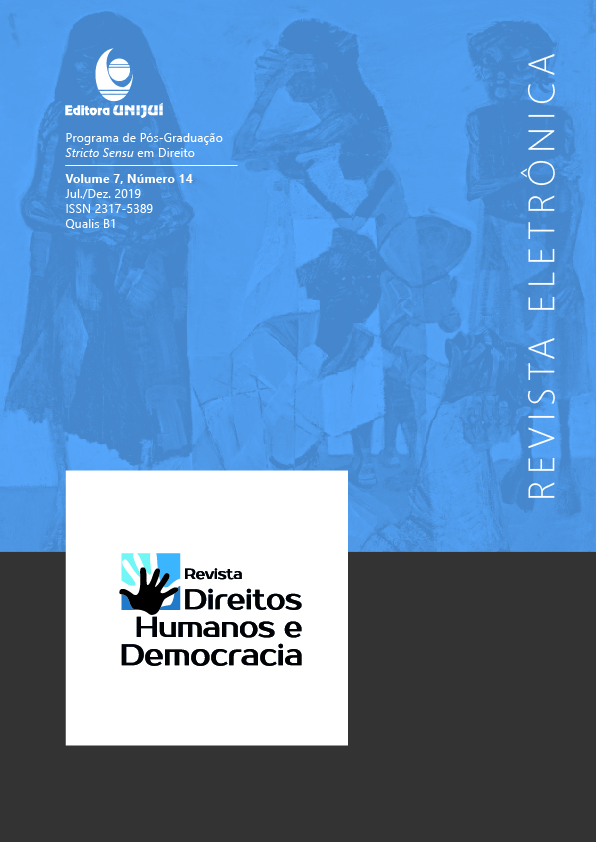A REINCIDÊNCIA CRIMINAL EM UMA ABORDAGEM FENOMENOLÓGICA: UM ESTUDO NA PENITENCIÁRIA PADRÃO REGIONAL DE CAMPINA GRANDE
DOI:
https://doi.org/10.21527/2317-5389.2019.14.263-286Resumo
Esta pesquisa objetiva analisar os fatores inibidores e propulsores da reincidência criminal nos discursos da sociedade civil e dos apenados reincidentes da Penitenciaria Padrão Regional de Campina Grande-PB. Para tanto, foram adotados os seguintes procedimentos: caracterização do ambiente de estudo; levantamento documental; aplicação de questionários. No que se refere à percepção do apenado, foram destacados como propulsores: condições do presídio, convívio com criminosos, falta de emprego, falta de políticas do governo, dependência e tráfico de drogas, nenhuma condição financeira, falta de apoio da sociedade, preconceito e revolta pela lentidão do processo. Já como fatores inibidores, estes ressaltaram: relação familiar, possibilidade de emprego, sentimento de insegurança física e mental, inimizades dentro do presídio, situação de encarceramento e condição do presídio. Quando comparado os discursos destes sujeitos com os da sociedade civil, coincidem como propulsores: o preconceito, a falta de emprego, a dependência de substâncias psicoativas, as políticas de ressocialização, as condições do presídio e o convívio com outros criminosos. Vale ressaltar que as características pessoais do apenado, a ausência de Deus e de perspectivas foram propulsores indicados apenas pela sociedade civil. No que tange aos aspectos inibidores, o único elemento coincidente entre os dois discursos foi à possibilidade de emprego.
Downloads
Publicado
Como Citar
Edição
Seção
Licença
Ao publicar na Revista Direitos Humanos e Democracia, os autores concordam com os seguintes termos:
Os trabalhos seguem a licença Creative Commons Atribuição 4.0 Internacional (CC BY 4.0), que permite:
Compartilhar — copiar e redistribuir o material em qualquer meio ou formato;
Adaptar — remixar, transformar e criar a partir do material para qualquer fim, inclusive comercial.
Essas permissões são irrevogáveis, desde que respeitados os seguintes termos:
Atribuição — os autores devem ser devidamente creditados, com link para a licença e indicação de eventuais alterações realizadas.
Sem restrições adicionais — não podem ser aplicadas condições legais ou tecnológicas que restrinjam o uso permitido pela licença.
Avisos:
A licença não se aplica a elementos em domínio público ou cobertos por exceções legais.
A licença não garante todos os direitos necessários para usos específicos (ex.: direitos de imagem, privacidade ou morais).
A revista não se responsabiliza pelas opiniões expressas nos artigos, que são de exclusiva responsabilidade dos autores. O Editor, com o apoio do Comitê Editorial, reserva-se o direito de sugerir ou solicitar modificações quando necessário.
Somente serão aceitos artigos científicos originais, com resultados de pesquisas de interesse que não tenham sido publicados nem submetidos simultaneamente a outro periódico com o mesmo objetivo.
A menção a marcas comerciais ou produtos específicos destina-se apenas à identificação, sem qualquer vínculo promocional por parte dos autores ou da revista.
Contrato de Licença: Os autores mantém os direitos autorais sobre seu artigo, e concedem a Revista Direitos Humanos e Democracia o direito de primeira publicação.













